Written by Alli L.
We all need good dental floss in our bathroom cabinets, right? Flossing is a crucial part of tooth and gum care to get rid of plaque, buildup, and pesky food particles.
Dental floss is far more enjoyable when it easily glides across your teeth, but unfortunately, most mainstream brands use materials that are covered in PFAS to give it that non-stick feel. As a result, toxins and chemicals can get wedged in between your teeth and mixed with saliva.
Yes, the amount might be minimal, but if you’re flossing every day, imagine how much that can accumulate over time. (Perhaps one of the most concerning things about PFAS is that they cannot be broken down by our bodies or the environment, which means they just stick around forever and continue building up.)
Additionally, most brands are not biodegradable or safe for the planet. Think about how much dental floss is thrown away by millions of people every day… That all ends up in a landfill somewhere.
To choose a safe, non-toxic dental floss without PFAS, let’s first figure out what materials you should definitely avoid.
Table of Contents
- What Kind of Toxins Are Commonly Found in Dental Floss?
- What Materials Should I Look for When Buying Non-Toxic Dental Floss?
- Beware of Greenwashing
- The Best Dental Floss Brands That Are Natural, Organic, Plastic-Free, & PFAS-Free
- OKAY Brands for PFAS-Free Dental Floss
- A Quick FAQ for Your Non-Toxic Dental Hygiene
- How often should I floss?
- Why is floss toxic?
- What major brands of dental floss contain PFAS?
- What dental floss is safe to use?
- Does waxed floss have PFAS?
- Conclusion
This article contains some affiliate links, which means we may earn a commission if you choose to make a purchase. We only make genuine recommendations that we truly believe in and meet our standards.
What Kind of Toxins Are Commonly Found in Dental Floss?
PFAS (Per- and Polyfluoroalkyl Substances)
PFAS are man-made chemicals that have been used in everyday products since the 1950s. Perhaps the most popular PFAS product is the Teflon non-toxic pan, but PFAS are also found in common household items like waterproof shoes and clothing, cosmetics, food packaging, and much more.
Due to the prevalence of PFAS in nearly everything we use, the particles now contaminate our water supplies and can be found in the bodies of 99% of Americans.
Current peer-reviewed research has linked PFAS to a pretty long list of negative health effects, such as damage to the liver, kidneys, and immune system. They have also been associated with thyroid disease, autoimmune disorders, cancer, and hormonal imbalances.
Exposure to PFAS has also been linked to reproductive effects and developmental delays in children. Scientists at the United States Environmental Protection Agency (EPA) and other federal agencies continue to conduct and monitor research on the effects of PFAS, as there are quite literally thousands of these types of chemicals with varying degrees of toxicity.
To make matters (a lot) worse, these toxins do not break down and can last for literally thousands of years. This is why they got the nickname, “forever chemicals.” This means they will stick around in our bodies, water supplies, and surrounding environments, building up and getting worse over time.
Plastic
Many dental floss brands are made from plastic and other types of petroleum derivatives. Nylon and polyester flosses often contain toxic endocrine disruptors (like BPA), which are used as plasticizers to make the floss more flexible.
Phthalates are known endocrine disruptors and have been linked to a number of health concerns, including things like infertility and thyroid dysfunction.
Not to mention, it’s terrible for our planet. Every year, some 18 billion pounds of plastic get tossed into the ocean and microplastics are being found all over the place (including human blood). The plastic used in dental floss cannot be recycled, either.
Choosing plastic-free dental floss is a small (and easy!) step towards bettering the planet and protecting your health.
Artificial Flavors
Most traditional floss uses artificial flavoring to achieve a minty taste and cooling sensation. While the FDA states that artificial flavors are “generally” safe, the jury is still out.
For one, there is very little regulation on artificial flavoring in America. And there isn’t sufficient research to confirm the long-term safety or side effects. The FDA even banned seven synthetic flavoring substances from the food additives list.
Companies are not required to list components of artificial flavors, unless they contain a common allergen. Therefore, individuals with allergies, sensitivities, and intolerances may be consuming inflammatory ingredients they are completely unaware of when using flavored floss.
What Materials Should I Look for When Buying Non-Toxic Dental Floss?

The thing is, there’s really no reason to use dental floss that contains all of those nasty toxins because there are many brands on the market dedicated to making non-toxic, biodegradable, and natural dental floss.
Some common materials used in eco-friendly and safe dental floss include:
Silk
Biodegradable, natural, and smooth on the gums. If you’re worried about the ethical practice of harvesting silkworms, consider Peace Silk, which doesn’t harm the insects during metamorphosis.
Bamboo
Bamboo is a great choice for plant-based, vegan floss. It grows easily (without toxic pesticides) and breaks down quickly.
It’s important to keep in mind, though, that turning bamboo from a plant to a flexible product can require a lot of chemicals. Some bamboo manufacturing methods are much safer than others. You can read more about that here.
Corn Fiber
Corn fiber is also another great choice for vegan and plant-based dental floss. Often listed as corn PLA on dental floss, it’s natural, biodegradable, and easily compostable. Try to look for corn fibers that are sourced from non-GMO corn.
Beware of Greenwashing
Choosing zero waste, eco-friendly brands has become trendier over the past decade, which of course comes with pros and cons.
Companies know that consumers are trying to find ways to reduce their impact on the planet, so they’ll market their products in a way that appears to be environmentally conscious when they really might not be. This is called “greenwashing.”
Here are a few things to look for to avoid dental hygiene products that have been greenwashed:
- Poor manufacturing practices: A product may appear to be made out of “green” materials, but how was it manufactured? Look for companies that source as locally as possible and produce in factories that don’t pollute in rivers and landfills. Also, look for brands that are transparent about the conditions under which their workers produce their products. Are they safe? Are they paid a living wage?
- Fluffy and/or unspecific language: If the language is too wordy or claims to be “eco-friendly” without any real description or explanation behind it, you know it’s fluff.
- Questionable labels and stamps of approval: Any brand can place an icon or stamp on their product to make it appear legitimate. Look for trusted labels such as USDA Organic, Fair Trade Certified, and Fair For Life.
- Green imagery without context: Why does a product’s website need to have pictures of trees and flowers if they’re selling organic dental floss? Beware of brands that use evocative pictures to give a green impression and don’t take such imagery at face value.
Related:
The Best Dental Floss Brands That Are Natural, Organic, Plastic-Free, & PFAS-Free
Now that you know what to look out for, here are our favorite brands for non-toxic, organic, and plastic-free dental floss. There are plenty of brands to choose from, so you’re sure to find something that fits your preferences!
Etee

Plastic-Free? Yes
Biodegradable? Yes
Organic? Yes
Material: Pure mulberry silk
Price: $12 for 2 spools
Pretty much everything about Etee floss is good for the planet, down to the soy-based ink printed on the boxes. From the reusable glass container to the 30m of 100% mulberry silk floss, you can’t go wrong with this brand.
Etee’s floss is coated in candelilla wax for smooth gliding between gums and a natural peppermint flavor to keep your breath fresh. And if for whatever reason you’re not happy with the product, they have a 90-day guarantee.
Use code THEFILTERY for 10% off.
Public Goods

Plastic-Free? Yes
Biodegradable? Yes
Organic? Yes
Material: 100% biodegradable silk
Price: $5.95 for 30m of floss
Public Goods sells a wide array of healthy, eco-friendly, and affordable products—from groceries to menstrual care to kitchen items.
Their dental floss is similar to that of Etee’s: it’s made with biodegradable silk, coated in candelilla wax, and stored in a small glass container. The reviews on the website are excellent, and you can tell the brand values sustainability above all. In 2019, they partnered with Eden Reforestation Projects, a nonprofit that plants millions of trees, supports impoverished communities, and combats climate change.
Georganics

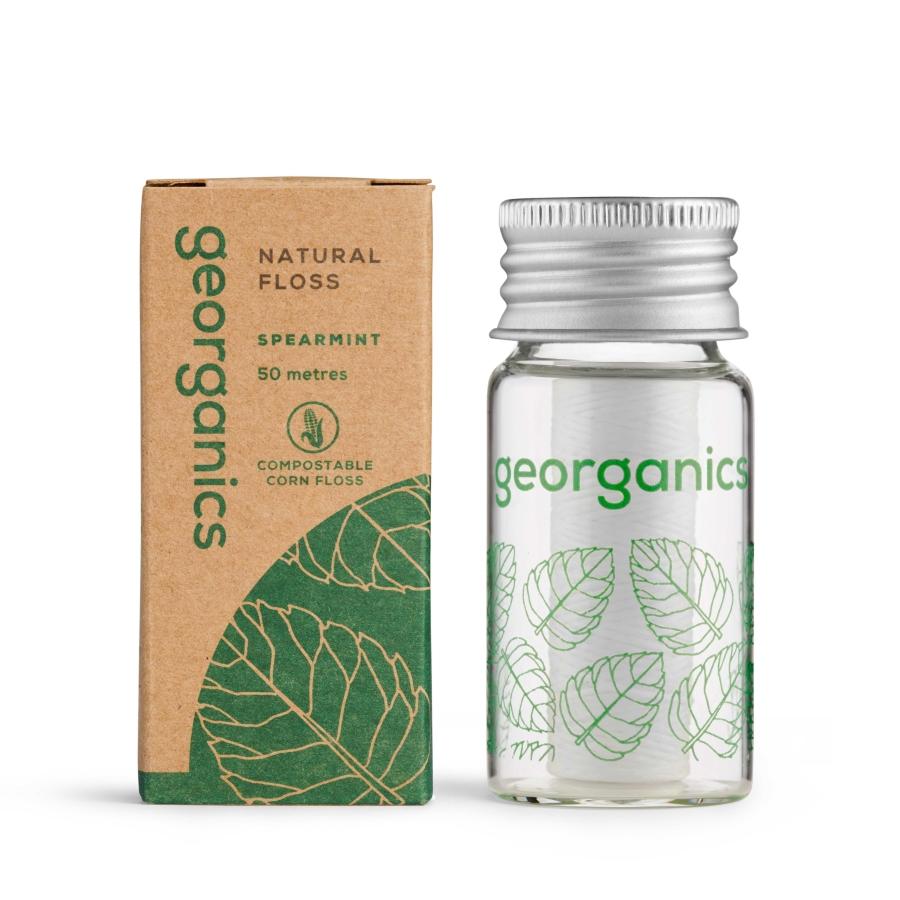
Plastic-Free? Yes
Biodegradable? Yes
Organic? Yes
Materials: Activated charcoal, corn PLA, vegetable wax
Price: $6.50
Georganics is a trusted brand dedicated to helping you clean your teeth safely, while reducing your impact on the environment.
This floss is made with corn PLA, a corn-based plastic that does not use petroleum. While PLA takes longer to break down, it can be compostes and does not emit toxic fumes when incinerated.
We also like that they have a citrus-flavored option for kids since a lot of little ones don’t like mint!
Georganics is also PETA Certified Cruelty Free, and the dental floss comes in a compostable PLA pouch and recycled packaging.
EcoRoots

Plastic-Free? Yes
Biodegradable? Yes
Organic? Yes
Material: Corn PLA, candelilla plant vegan wax, organic peppermint oil, organic tea tree oil
Price: $9.99
EcoRoots offers a great zero-waste floss made of compostable corn fiber naturally coated with plant-based candelilla wax and all-natural minty essential oils.
Plus, all of their packaging is recyclable and compostable.
Bambo Earth

Plastic-Free? Yes
Biodegradable? Yes
Organic? Yes
Materials: Natural silk thread, candelilla wax
Price: $6.97
This floss is pretty much everything you should look for in a zero-waste, non-toxic dental floss. Their website advertises the floss as natural, eco-friendly, zero-waste, biodegradable, recyclable, plant-based, and compostable. Made of the highest quality natural silk thread, the floss is coated with candelilla wax for smooth gliding with a light mint flavor.
OKAY Brands for PFAS-Free Dental Floss
Here are some more good options for PFAS-free floss brands that contain some synthetic materials.
Cocofloss


Plastic-Free? No
Biodegradable? Partly
Organic? Partly
Material: Recycled polyester, sourced from plastic water bottles
Price: $27 for entire package (Cocobrush, Cocofloss, refill set)
Cocofloss is spun from 85% recycled polyester from discarded plastic water bottles. According to their website, the threads take 64% less energy to produce, resulting in 32% less CO2 emissions. The floss is infused with coconut oil, as opposed to artificial flavors.
Products made from recycled plastic definitely have their pros and cons. They can save a lot of trash from the landfills, but on the other hand, it’s almost impossible to ensure customers that the products are phthalate-free.
Cocofloss has assured us, however, that they are PFAS-free.
The Cocofloss Smile Bliss Set includes the extra soft Cocobrush, a 2-month supply of Cocofloss, and an extra Cocofloss refill. Then you can purchase additional floss refills separately.
Lucky Teeth

Plastic-Free? No (uses a biodegradable polymer)
Biodegradable? Yes
Organic? Yes
Materials: Bamboo, activated charcoal, organic peppermint oil
Price: $9.99 per 30m spool
One of the strongest non-toxic flosses out there, Lucky Teeth uses activated charcoal powder and essential oils for a clean, fresh scrub between teeth. Activated charcoal has amazing anti-bacterial properties and clings to plaque to remove buildup.
This floss uses PBAT, a fully biodegradable polymer that completely breaks down without emitting harmful toxins.
Desert Essence
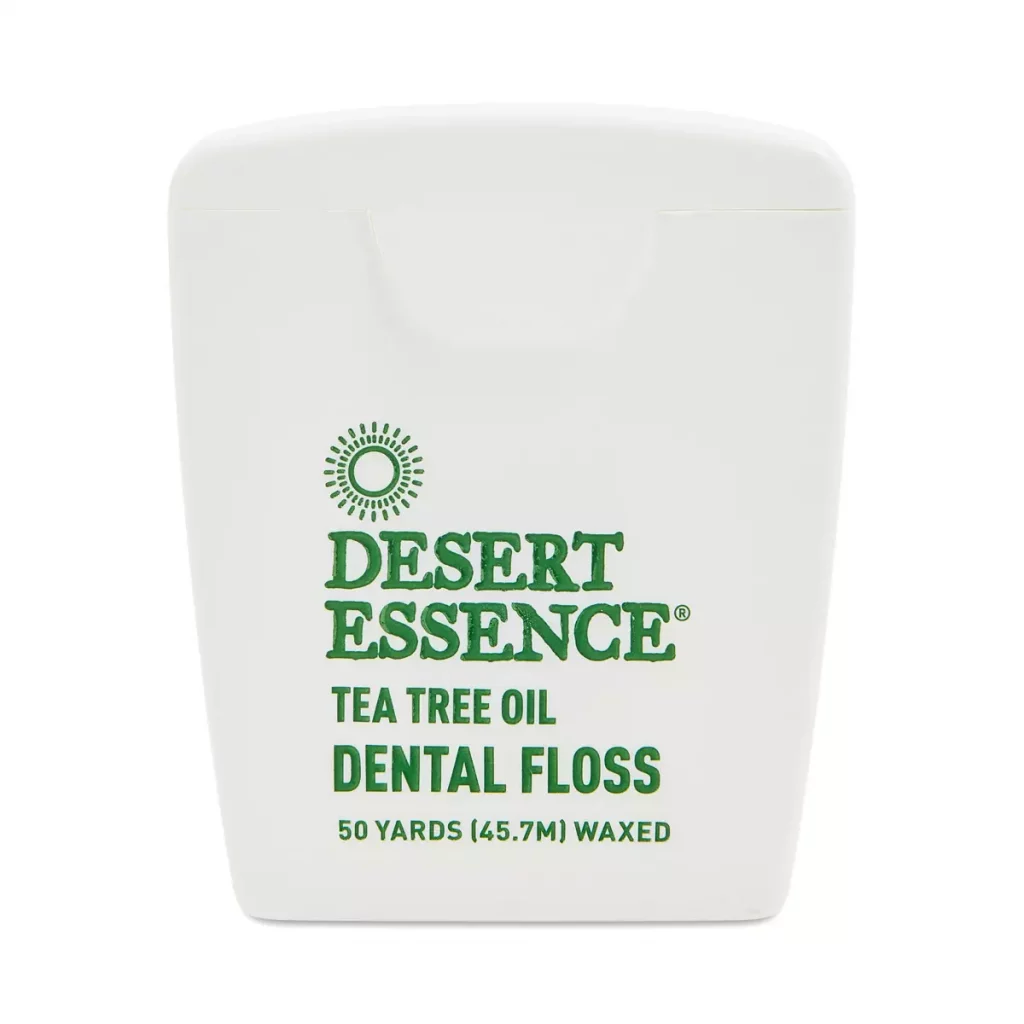
Plastic-Free? No (nylon thread)
Biodegradable? Partly
Organic? No
Materials: PFA-free nylon, Cera Alba (Beeswax), Melaleuca Alternifolia (Tea Tree) Leaf Oil, Mentha Piperita (Peppermint) Oil, Mentha Viridis (Spearmint) Leaf Oil
Price: $14.95 for 2 spools
While Dessert Essence does use a nylon thread, it is PFAS-free, and all other ingredients are natural and eco-friendly. This floss is infused with a soothing Australian tea tree oil and mint, so you get a nice fresh taste in your mouth. The sustainably sourced beeswax coating allows floss to glide easily between your teeth.
Risewell

Plastic-Free? No (polyester filament)
Biodegradable? Partly
Organic? Partly
Materials: Polyester filament, vegan wax, hydroxyapatite, spearmint oil, xylitol, stevia
Price: $8
Risewell advertises what’s not in their floss: no artificial flavors, no Teflon (a.k.a. PFAS), and no petroleum-based wax.
Known for their n, Risewell is one of the first brands to infuse hydroxyapatite, a natural mineral that comprises 90% of our tooth enamel, into dental floss instead of fluoride. As you may know, most dental products out there (toothpaste, mouthwash, floss) use fluoride to help strengthen teeth, but it’s been shown to have adverse effects in large quantities and for children below the age of six.
One ingredient to be wary of in the Risewell floss is the sugar alcohol xylitol, which for some can cause digestive issues such as gas, bloating, and diarrhea.
Dr. Tung’s
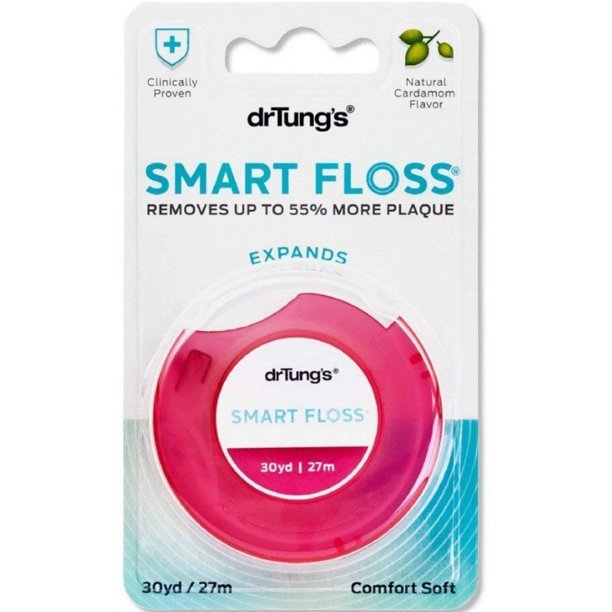
Plastic-Free? No (polyester filament)
Biodegradable? Partly
Organic? Partly
Material: Polyester coated with a natural plant wax, natural lemongrass oil, curcuma xanthorrhiza, activated charcoal
Price: $5.99
Although made with a polyester filament, all of Dr. Tung’s flosses are PFAS- and PTFE-free. The floss is flavored with a tangy lemongrass oil for an unexpected, fresh taste, and the activated charcoal helps absorb bacteria and plaque between teeth. The packaging is also 100% recyclable paperboard.
The good thing about Dr. Tung’s is that it’s available at big box stores like Walmart, so it’s a good choice if you’re at the store and in a pinch!
A Floss Alternative: Waterpik
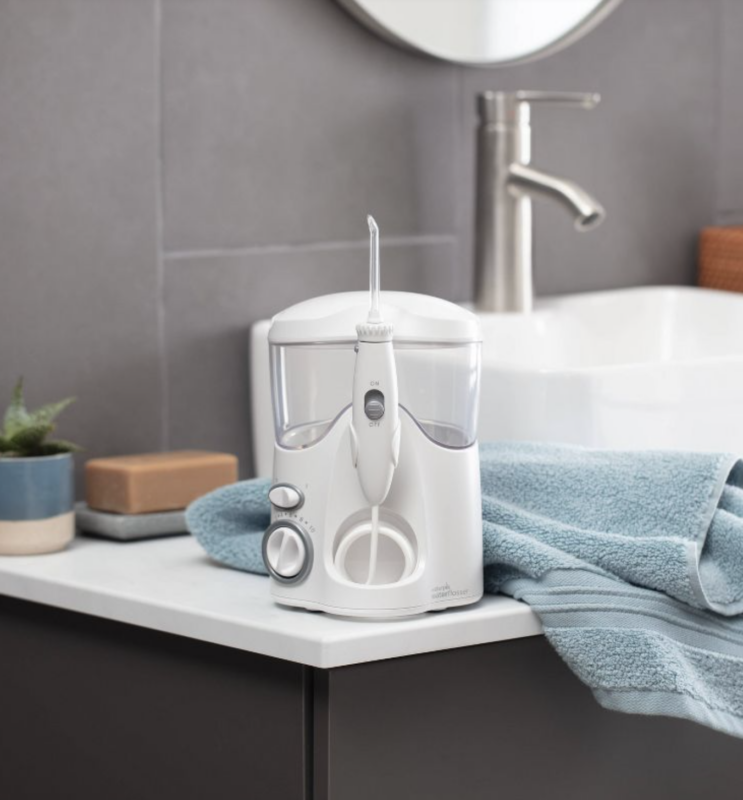

Plastic-Free? No
Price: $36-90
Another option is to use a Waterpik instead of traditional dental floss! I finally started using one of these after I started seeing a biological dentist. In short, water-flossers are supposed to be more effective at removing plaque below the gum line. They’re also a great option for people with braces and those with very sensitive gums (since you can control the intensity of the water flow and it doesn’t lead to bleeding gums like flossing can).
Using the Waterpik is a PFAS-free option, but it’s not a plastic-free option. The company says the plastic used is BPA-free, but that doesn’t necessarily mean it’s free from all endocrine disrupting chemicals. For me personally, I’m not too worried about this because of the fact that the water doesn’t sit in the container. You just fill it up and squirt it right back out into your mouth, so there isn’t much time for any potential EDCs to leach from the plastic into the water. You also don’t swallow the water, so you’re not ingesting it. For me, the overall benefits of plaque-reduction outweigh the potential costs. As always, you should make the best decision for yourself!
A Quick FAQ for Your Non-Toxic Dental Hygiene
How often should I floss?
The American Dental Association recommends that you floss every single day, in addition to brushing your teeth every day. Flossing improves oral hygiene by removing plaque and food particles to protect your gums and teeth from gingivitis.
Why is floss toxic?
Many brands of dental floss are toxic because they include PFAS (“forever chemicals”) as well as things like phthalates, which are commonly found in plastic products.
These materials have been linked to negative health side effects. Because we use many different products that contain these chemicals every day, choosing a non-toxic and natural dental floss is crucial to help reduce exposure, especially since the floss is going directly in your mouth!
What major brands of dental floss contain PFAS?
The truth is that most conventional floss brands contain PFAS…
- Oral-B Glide Floss was shown to cause higher levels of PFHxS (perfluorohexane sulfonic acid) in a test subject’s bloodstream than those who didn’t use the floss.
- Colgate Total Dental Floss markets themselves as a “single strand of Teflon fiber.” No thanks!
- Glide Floss is developed by Gore, a company known for their waterproof technology that uses PTFE.
- CVS Health SuperSlip was shown to have high levels of PFAS in a 2019 study done by the Silent Spring Institute in Newton, MA.
What dental floss is safe to use?
Dental floss free from PFAS and plastics are your best bet for optimal tooth health. Choose plant-based, biodegradable materials such as silk, bamboo, corn fiber, and charcoal—such as those brands listed above.
Many dental floss brands also include refillable, reusable glass containers, so you can simply buy new spools without wasting extra packaging.
Does waxed floss have PFAS?
Yes, many brands of waxed floss have PFAS such as Glide, Colgate, and Oral-B. These brands use petroleum to achieve that smooth glide feel. Petroleum contains harmful chemicals that have been linked to endocrine disruption.
Conclusion
Now that you’ve had a thorough review of the ingredients and materials to avoid in dental floss and the safe brands to choose from, we hope you feel armed with the right information to choose the best natural dental floss that’s right for you.
As you continue to choose products for your home, your family, and for yourself, choosing a non-toxic dental floss is a single step in the right direction.

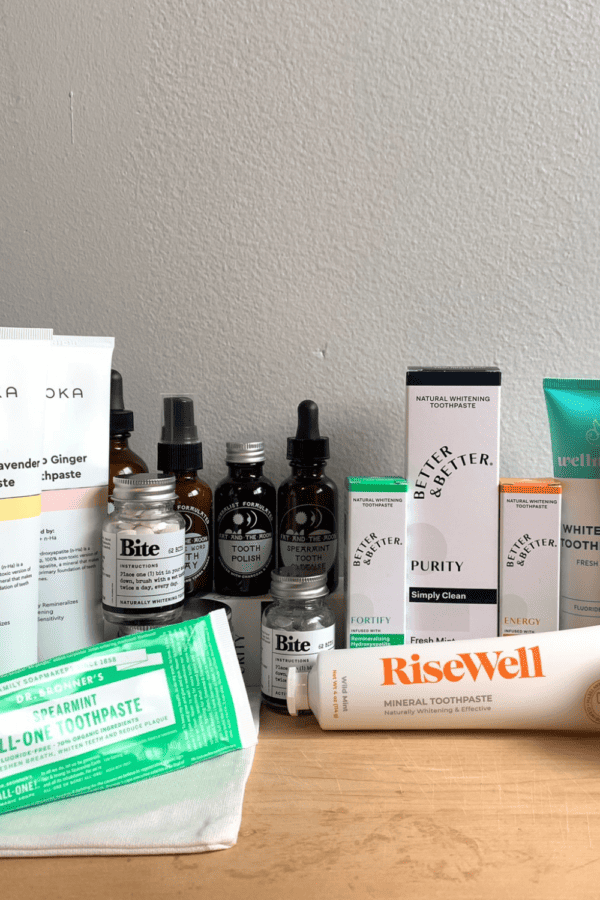

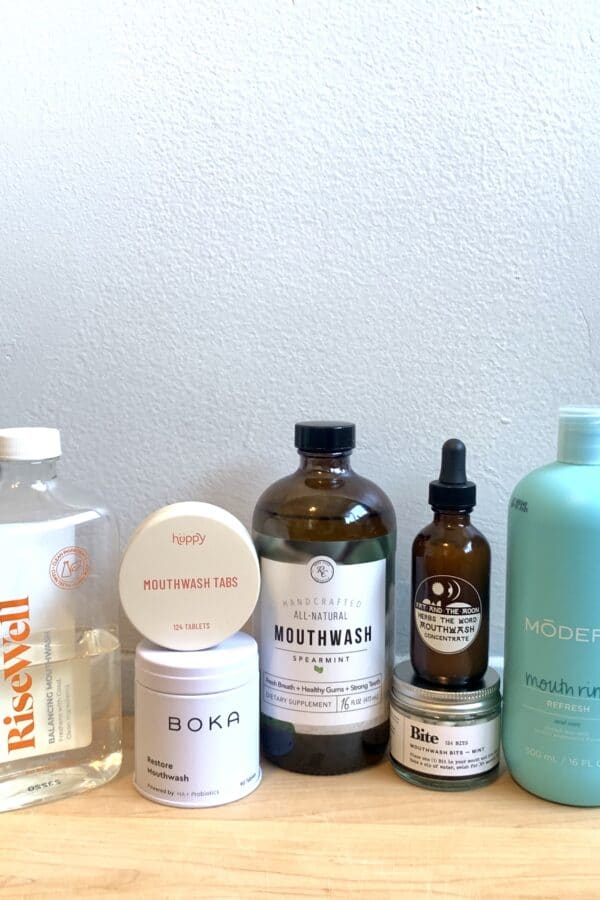

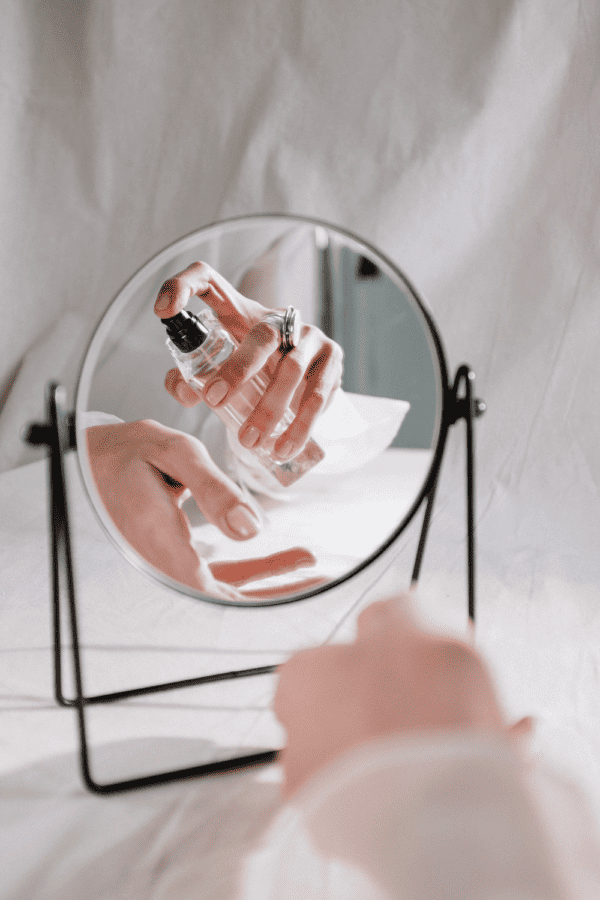
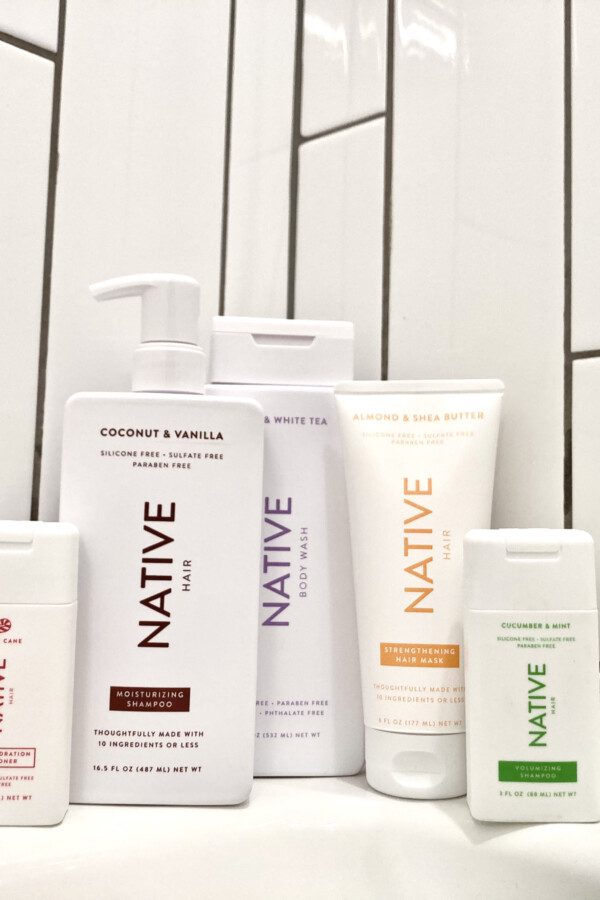
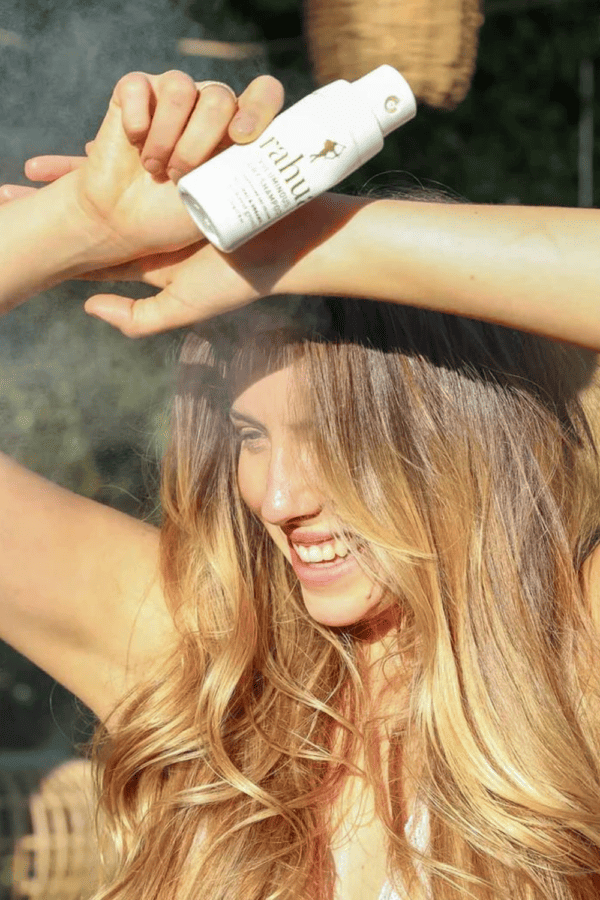
Love your blogs! Keep ‘em coming 🙂
You should also have an instagram page! Lol